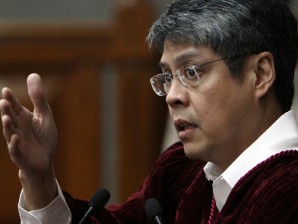The multibillion peso importation of rice appears to have been cornered by a few businessmen who use scores of farmers’ cooperatives as dummies to get licenses from the National Food Authority (NFA), according to Sen. Francis Pangilinan.
Pangilinan, chairman of the Senate committee on agriculture which is looking into rice smuggling in the country, sounded the alarm after his panel learned during its hearings last week that some groups with import licenses shared the same bank branch although they were based in different areas.
“There are disturbing indications that unscrupulous traders have been able to corner the business of rice importation that runs in the billions [of pesos],” Pangilinan said in a text message to the Philippine Daily Inquirer after his committee’s last hearing before the congressional break.
“How else explain these alleged farmers cooperatives all securing [National Bureau of Investigation] permits on the same day, bogus office addresses, various cooperatives sharing the same bank branch despite these groups coming from Luzon, the Visayas and Mindanao,” he added.
Blindsided
Sen. Teofisto Guingona III urged the NFA on Sept. 19 to do a background check on the financial capacity of its licensed rice importers “to put an end to the seeming control by the few unscrupulous entities of the rice importation process.”
Guingona said NFA officials may have been blindsided by a small group of businessmen who want to control the country’s rice importation program by using cooperatives as dummies or by submitting false documents.
“We should not allow a few individuals or groups to control rice importation in the country,” Guingona said in a statement after a hearing of the committee on agriculture.
Bidding irregularities
“Rice is the primary food of our countrymen and therefore it’s only proper that we closely watch those who seem to be running circles around the authorities as regard the rice importation,” he added.
During a hearing last week, Guingona presented his research on irregularities in the bidding process of NFA.
Guingona said it appeared that some winning bidders in the importation process were operating together and could be mere “dummies” of individuals or groups that want to monopolize the rice importation in the country.
Guingona said in his presentation that the financial situation of some bidders, who won importation licenses from the NFA, were incapable of paying the service fees ranging from P50 million to P69 million.
“Imagine a bidder with only about P50,000 in capital can pay a service fee amounting to P50 million to P69 million. And we are not talking of just one bidder here but numerous,” Guingona said.
He described the situation as anomalous. “How could the bidder pay so huge an amount when his total assets didn’t even reach a million pesos?” he asked.
He added that many of the winning bidders got their NBI certificates and Department of Trade and Industry registration papers on the same dates although the invitation to bid was still two months away. Norman Bordadora
